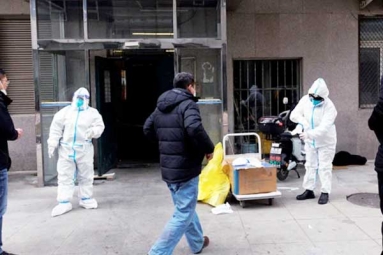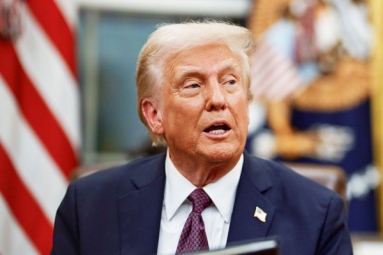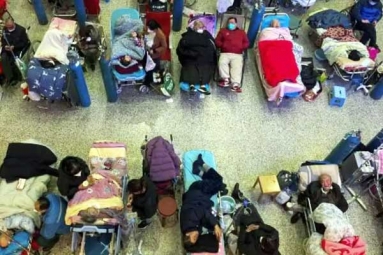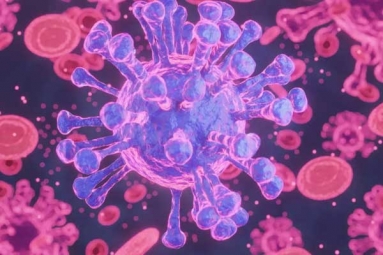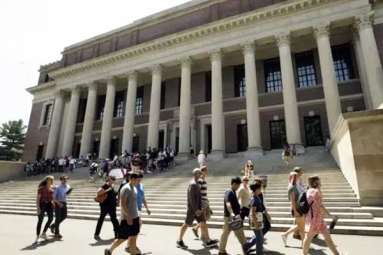
(Image source from: Theguardian.com)
One of the biggest challenges about the Covid-19 pandemic is the lack of knowledge surrounding its origin. Some of the leading virologists are working to find how such a lethal virus could find its way through the wilds of rural China into such a major human population. They are also looking for answers on the kind of chain of genetic mutations the pathogen produced for such level of mass transmission.
Finding the origin of Sars-CoV-2 is one of the most crucial steps to stopping the pandemic that has claimed over 283,000 lives worldwide. Not just that, it has also triggered what the economists believe is the worst economic collapse since the Great Depression.
Majority of the crash vaccine trials are being conducted in US, Europe and China to help the infected and be prepared for the worst in case the virus takes a longer time to be waned than what the experts are foreseeing.
While the treatment and vaccine research is underway, the other factor that the researchers are focusing to reduce the impacts of this deadly virus is to source its origin and retrace the pathogen’s journey around the globe. This means that the researchers have to start from where it began - in China.
“We have some kind of a missing link in that story between the origin of the virus and when it started to circulate in humans,” said Peter Ben Embarek, a WHO food safety and animal diseases expert.
Just last week, WHO sought permission from the officials in Beijing to send a team of epidemiologists for the further investigation. China is yet to sign the same and to grant the permission that is needed for faster investigation of the situation.
President Xi Jinping has reported that they are keeping a strict eye and control on the Chinese scientific research, which first needs to be approved by the authorities after which they can be posted.
With the number of deaths rising and the impacts on the economy worsening, the pressure on Beijing to allow international researchers for scientific investigation has been increasing too. They are going to include field works, examine the virus sample that the country has been very secretive about.
The researchers believe that there is a gap in the knowledge which is what is making it impossible for the health officials and the government officials to contain the spread and prevent the future pandemics.
Around 70% of the emerging infectious diseases across the world are zoonotic, meaning that they spread from animals to humans. The Genome sequencing of SARS-CoV-2 has shown that it is related to two other similar coronaviruses that is found in bats.
Much like SARS and MERS, the researchers believe that the SARS-CoV-2 likely has a similar journey but the researchers are yet to find an intermediate animal host that is likely making it happen. While the civet cats were believed to be the source of origin in case of SARS, camels were the source in case of MERS. But, the researchers have failed to establish for sure what the source for Covid-19 is.
Are the household pets a risk?
With the unknown animal vector a risk to the human population because of the rapid spread of Covid-19, the WHO researchers have reported that the household cats can transmit the virus to other felines. There has been no established evidence that show that pets can transmit the disease to the human owners.
The constant animosity and blame game between US and China is also a possible obstruction to further finding of the reasons involved. The Trump administration has been consistently accusing China of intentionally spreading the virus from one of the laboratories stationed in Wuhan, although there has been no evidence to the claims.
Bridging the gaps
The scientists who have studied the genetics of the virus have reported that it is not human made but natural.
“An accidental release from the research center in Wuhan is possible in theory, but "just so implausible," said Stanley Perlman, a professor of microbiology and immunology at the University of Iowa.
One of the most common reasons behind the accusation is because of the reputation of Shi Zhengli, a 56-year-old deputy director of the Wuhan Institute of Virology. Shi published a paper in February highlighting how the genomic sequence of the Sars-CoV-2 was 96% similar to the natural reservoir of coronaviruses that she found in Yunnan in 2004.
But, Shi later clarified to Scientific American that the genetic characteristics that she was studying in the lab didn’t match with the ones that are spreading among the humans.
Even with the clarifications, the researchers are again back to square one trying to figure out the origin of the virus. While the prior reports have suggested that the Covid-19 outbreak likely happened in the wet market near Wuhan, the researchers are not sure whether the virus spread from there or was simply discovered there.
Peter Daszak, a disease ecologist at nonprofit EcoHealth Alliance reported that the Covid-19 outbreak happened before December and not from Wuhan but from somewhere else.
"This particular outbreak probably was in people circulating in South or Central China back in November" or even earlier,” Daszak further reported.
Another common question the researchers have is whether or not the virus spread from the bats directly to the humans or there has been a secondary source that people aren’t aware of. If there are secondary sources, it is likely that the spread is still likely happening.
But, in case the virus has been transmitting directly from the bats, it is important to track the exact spot where it happened. Knowing this will help the authorities govern the necessary precaution to keep the spread contained.
In order to get a clearer picture of the situation, it is important that the scientific detective work is done. Consistently following the trail of genetically similar versions, it helps the disease trackers stay ahead of the game and identify the progression of the disease.
Tracing back to the origin of the disease will also require necessary cooperation from the Chinese government. The international investigators will require unfiltered access to the Wuhan wet market, wildlife vendors and even the animal population and patient data in China.
But, the price for keeping the SARS-CoV-2's origins a secret will be high. The lack of better research and surveillance could perpetuate another wave of pandemic before we know it. This is the reason why localising the origin is a necessity at this point of time.
- Somapika Dutta







